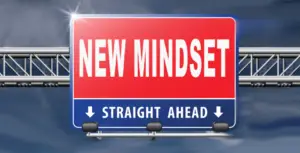Are You Self-sabotaging Because of Your Past?

The story written here is from a series of coaching conversations and is being used with permission, and without identity. Sessions are designed to guide a person toward recognizing the mindset and behavioral responses that create obstacles to achieving happiness.
The scenario below compares two responses to a situation.
One is steeped in memories from the past (in this case, the fear of abandonment). The other is from the moment of right now.
It is a strong example of how our thoughts create our realities. And how we can self-sabotage the positives in our life by holding on to the negatives of the past. How do you feel after reading this scenario?
THE SCENE:
After a delightful evening of dinner and conversation, persons 1 and 2 say goodbye.
“Please let me know when you are home safely, the rain is coming down hard.” Person 1 says. “I promise,” is the response. Person 1 looks at the time and mentally logs that it will be no more than 30 minutes before the ‘Made it safely!’ message comes in from person 2.
When person 2 arrives home, a neighbor is walking up to their doorstep in the downpour. “Oh, I’m so glad you’re home! I don’t how I locked myself out of my house. It’s not dead-bolted, but my phone and everything is inside, and I can’t get in. Can you help me?”
“Of course!” says person 2, and they run through the rain to the neighbor’s house.
Person 2 has forgotten, for the moment, the promise to text.
| TIME | PERSON 1 RESPONSE (PAST ABANDONMENT) |
PERSON 1 RESPONSE (PRESENT MOMENT) |
| 35 MINS. | Knows he’s almost home. Keeps emotions in check, thinking, I can’t show my excitement just yet. | Waits patiently. Doesn’t look at time. Smiles at the evening. Looks forward to his text. |
| 45 MINS. | First twinges of angst. Wants to text but doesn’t want him to know she cares enough to be concerned. | Hopes he’s safe. Wants to text but doesn’t want to distract him if he’s still driving in the rain. |
| 1 HR. | Begins to feel the familiar emotions of the past and thinks “30 minutes late. He’s just like everyone else. Well, it wasn’t such a great evening, anyway.” Puts the phone face down, and refuses to check-in. | Sends a text, “Please let me know you’re okay. I’ll call you in a few minutes if I don’t hear from you. Had a wonderful time this evening.” |
| 1.5 HRS. | Worked up to full steam. Imagines he’s with someone else. Sends a text, “Clearly, I had you all wrong.” | Hopes he received her voicemail. Wonders if she should drive the route he would have taken home in case something happened. |
| 1.75 HRS. | Phone rings. It’s him. She ignores it. Anxiety fills her. She sees voicemail notification and listens.
“Sorry. A neighbor caught me just as I arrived. She was locked out and I helped her get in. What do you mean ‘Clearly I had you all wrong?’ Call me.” He sounds so earnest, she thinks. And pushes that out of her mind. Instead, she focuses on every little thing in their evening that clued her to the fact that he was a short-timer. |
Phone rings. It’s him. She reaches for the phone. Relief washes over her, “Hi. Is everything okay? I was just getting dressed to drive your way,” she says.
“I’m so sorry, a neighbor caught me just as I arrived. She was locked out, and I helped her get in. I regret that I worried you. I didn’t take my phone out into the rain. Thank you for your sweet voicemail. I had a wonderful time too.” He sounds so earnest, she thinks. She really likes that. |
| She calls him back, “I got your message. Listen, you’re a nice guy, but I just don’t think it clicked with us.”
He’s confused. “I thought we both had a nice time. Am I missing something?” “No,” she says. I just don’t see it working for us.” The familiar pain is in her entire being now. Yes, she DEFINITELY doesn’t want to relive this. Best to end it. |
She says into the phone: “I’m so glad you’re safe. It is so kind of you to help a neighbor. It is exactly the kind of thing I would imagine you would do. I’m sure she was grateful.” “She was,” he replied. “And, it was nothing. I would hope anyone would do the same.
“I’d like to see you again,” he adds. Me too, she says. |
|
| 1.8 HRS. | Confused, he wishes her well and ends the call.
She sits quietly in her pain, wondering why it’s always this way—why they never stay. |
She is smiling, as they end their call.
She is looking forward to the next time they meet. And the next time, and the next time. |
Background on the client session that inspired this post.
CLIENT A:
Throughout her life, she was saying goodbye to someone she loved. First, her beloved grandparents, whose home gave her comfort when mom and dad were fighting. Her father, when he left her mother and never looked back. Later in life, the friends she said goodbye to when her mother could no longer afford to live in the homes they rented or had to keep moving for new jobs. As she grew into her teen years, breakups were traumatizing to her—much more so than her friends experiencing the same. She had the tendency to react swiftly and severely at what she perceived to be the first sign of trouble.
Her inability to see what was happening is not uncommon. As was her belief that what is past is past, and has no bearing on her present.
The attitude of “Why put effort into it. It’s only temporary,” infiltrated every major part of her life. Jobs—layoffs. Friendships—separations. Marriage—divorce. This negativity began to wear on her friends, and they too, eventually left — emphasizing her belief that no one stays.
Perhaps if a friend or colleague’s history was known to us, we would offer up more understanding.
Perhaps, we can practice living our present life not tainted by a negative experience from our past.
Better still, we do both.
FOOD FOR THOUGHT:
Many of us think, “Yesterday is gone. I don’t even think about it.” But is that true?
Think of a version of the above scenario in your own life, and ask yourself ‘Am I responding to the moment of now. Or to an unrelated memory from the past?’ If the latter, what step can you take today to change?




